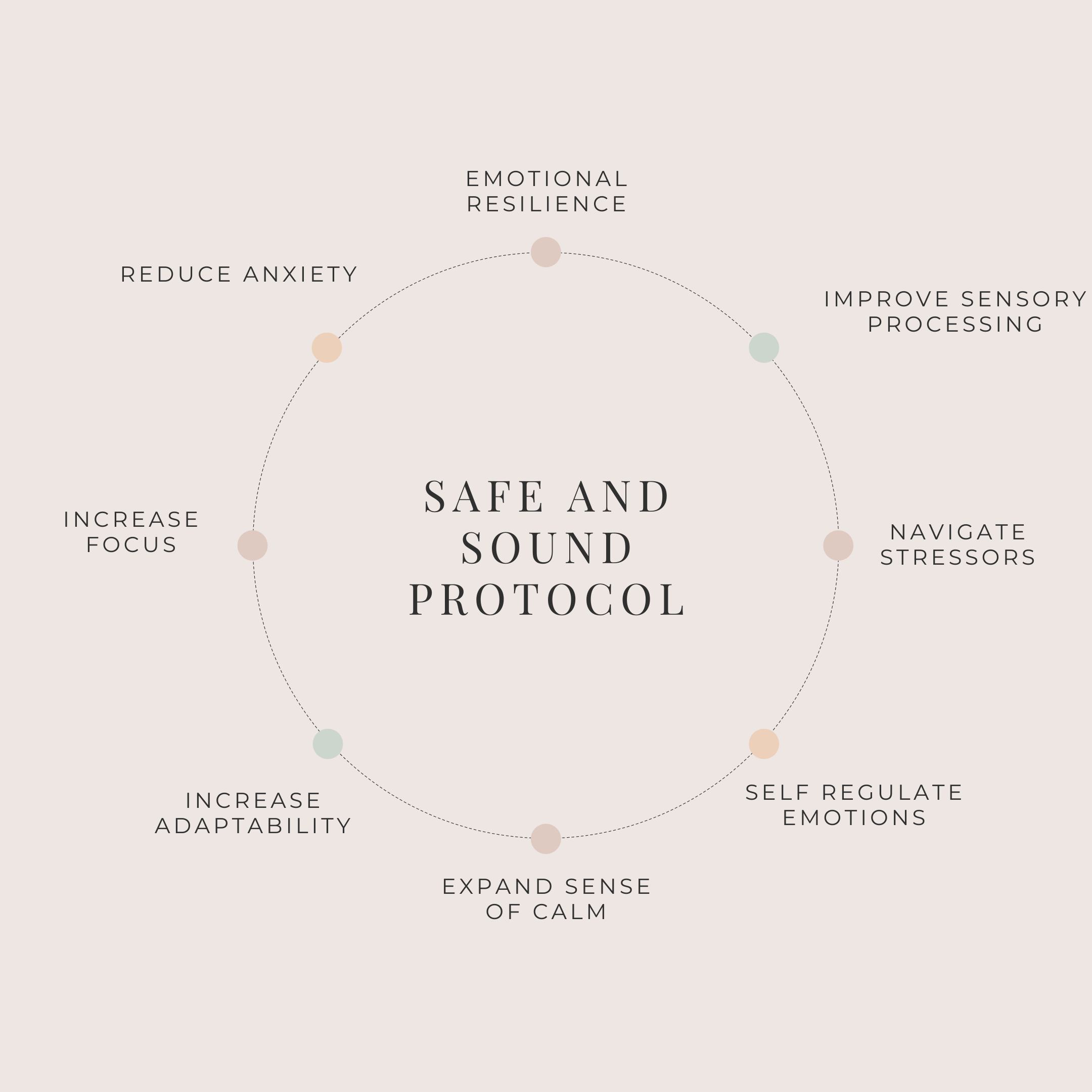Safe and Sound Protocol
reconnect to yourself, others, and live a more centered life
What is the Safe and Sound Protocol?
Are you feeling overwhelmed by chronic stress, sensory overload, or discomfort in your body? Do you struggle with agitation or anxiety that seems to arise without an apparent cause?
The Safe and Sound Protocol (SSP) is a groundbreaking, science-backed therapy designed to help regulate the nervous system. By shifting the body out of fight, flight, or freeze responses and into a state of rest and digest, SSP promotes a profound sense of calm and safety.
Developed by Dr. Stephen Porges and rooted in Polyvagal Theory, SSP works by using specially curated music to stimulate the vagus nerve and retrain the nervous system to respond more adaptively to stress. Learn more about the science behind the Safe and Sound Protocol here.
Sara Moskowitz, LCSW, SEP, is a Somatic Experiencing Practitioner based in Chicago and licensed to provide telehealth services throughout Illinois. With over eight years of experience, Sara has helped clients find ease in their bodies, regulate their nervous systems, and experience relief from the symptoms of trauma and chronic stress.
What is Safe and Sound Protocol Used For?
The Safe and Sound Protocol (SSP) is a powerful tool designed to regulate the nervous system and promote overall well-being. Since a dysregulated nervous system can show up in many ways, SSP has broad applications for individuals facing diverse challenges.
Who Can Benefit from SSP?
Clinical research and real-world experience show that SSP can provide relief and improvement for those experiencing:
- Anxiety
- Trauma history
- Social difficulties
- Sensory processing difficulty
- POTS/dysautonomia
- Misophonia
- Mast cell activation
- Chronic Pain
- Long COVID
- Learning disorders
- And more
What Are the Benefits of SSP?
By gently guiding the nervous system into a state of balance, SSP offers numerous benefits, including:
- Improved emotional regulation
- Reduced anxiety and stress
- Increased presence in your relationships
- Enhanced overall well-being & ease
- Reduction of traumatic symptoms

What is a Dysregulated Nervous System?: Understanding Stress and Its Impact
Nervous system dysregulation occurs when your body struggles to shift smoothly between different states of activation and rest. This imbalance can leave you feeling “stuck” in certain patterns:
- Stuck on “ON”: Constantly in overdrive, feeling anxious, hypervigilant, or overwhelmed.
- Stuck on “OFF”: Struggling with low energy, exhaustion, or difficulty finding motivation to get through the day.
When the nervous system is unable to move smoothly between these states, it can impact your physical health, emotional well-being, and relationships. Symptoms like chronic stress, anxiety, or burnout may seem overwhelming to deal with, but regulation is possible.
The Safe and Sound Protocol (SSP) offers a proven approach to help recalibrate the nervous system, making it easier to find balance, resilience, and ease.
Common Signs of Stress
Stress affects everyone differently, but some of the most common signs of stress include:
- Anxiety and heightened panic: Persistent worry or sudden feelings of fear.
- Physical tension: Tightness in areas like the hips, neck, and shoulders.
- Irritability: A shorter temper or heightened sensitivity to triggers.
- Fatigue: Constant exhaustion, even after rest.
- Sensory overwhelm: Feeling overstimulated by noise, lights, or activity.
- Racing thoughts: A mind that feels stuck in overdrive.
- Difficulty focusing: Struggling to concentrate or stay present.
- Insomnia and restlessness: Trouble falling asleep or staying asleep.
When stress goes untreated, it can contribute to more serious health issues over time, including:
- Autoimmune disorders.
- Digestive dysfunction.
- Endocrine imbalances.
- Cardiovascular symptoms.
Recognizing these signs early is key to managing stress effectively and preventing further health complications.
How the Safe and Sound Protocol (SSP) Can Help with Stress
Since stress often manifests physically, creating a connection between the mind and body is essential for healing. The Safe and Sound Protocol (SSP) uses a gentle, music-based approach to support nervous system regulation by:
- Encouraging a state of calm and relaxation.
- Helping the body shift out of fight-or-flight responses.
- Building resilience to stress over time.
Whether you’re experiencing mild stress or navigating the long-term effects of chronic stress, the SSP offers an accessible and effective way to bring balance and ease back to your life.
Common Signs of Stress

About Somatic Psychotherapy Chicago

Our Philosophy
At Somatic Psychotherapy Chicago, we assess the individual symptoms that you have and decode them to help them run their course. For example, perhaps tension in a specific muscle combined with surges of panic is actually your body communicating that it needed to defend itself in a way that it never got to do yet. Once your body senses that it has effectively used its trauma response, that response will recede. And importantly, if that symptom comes up again, you’ll remember how to deal with it.
An important element of the work at Somatic Psychotherapy Chicago is the emphasis on the unique experience of everyone’s nervous system. There are many ways that a body may express its trauma, and each expression requires a different intervention. Tools like breathing can be helpful for some folks and feel like torture for others. We work together to find a method that is not only pleasant for you, but fits into your lifestyle. For example, a busy mom of toddlers isn’t going to find 30 minutes to meditate, so the tools we’d develop for her would be portable and able to be implemented in the face of tantrums and the day-to-day responsibilities of parenting.
Sessions can always be focused on learning what is going on during a trauma response at a level that works best for you. Whether you’re the “rather not revisit science class” type who prefers your learning to be in metaphor form or you’d like to understand the nitty gritty science behind polyvagal theory, Sara will meet your learning style and adapt the space to your needs.
Meet Sara Moskowitz
Sara Moskowitz is a somatic psychotherapist and the owner of Somatic Psychotherapy Chicago. Her specialties include:
- Pre- and perinatal trauma
- Early developmental trauma
- Transgenerational trauma
- Event trauma
- Medical trauma
- Sexual boundary violation trauma
A lifelong learner and self-proclaimed nerd, Sara has over 400 hours of post-graduate trauma training (and counting). Sara’s advanced training in Somatic Experiencing includes:
- Advanced Strategies for Working with Sexual Trauma and Sexuality with SE Faculty Arielle Giaretto
- Healing Sexual Trauma with SE Founder Peter Levine and Kimberly Ann Johnson, SEP
- It’s Never Too Late: Healing Prebirth and Birth at Any Age with Mia Kalef
- Pre- and Perinatal Trauma Workshop with SE Faculty Raja Selvam
- Relational Development, Rupture and Repair Workshop with SE Faculty Dave Berger and Abi Blakeslee
- Touch Skills Training Level 1 with SE Faculty Kathy Kain
- Jewish Ancestral Healing with Taya Mâ Shere, SEP
Sara is also passionate about psychoeducation, or helping clients understand what exactly is happening in their bodies. Sometimes understanding what is happening can make all of the difference when it comes to feeling intimidated (or not) by seemingly random symptoms.
Feel a connection? Reach out today!
What do I need to bring to my sessions?
Not much! You’ll need a set of over the ear headphones to listen to the music. If there’s something you’d like to occupy yourself with as you listen (fidget toys, coloring books, knitting, etc.), those are great too.
What is included?
The SSP package includes:
- 55 minute one-on-one intake session
- 5 hours of listening time*
- 55 minute debrief session
- Nervous System Regulating Activities eBook
*Music is divided into short listening sessions – you don’t have to do all 5 hours at once!
Support is available by text and email throughout your experience.
Is Safe and Sound Protocol covered by insurance?
BCBS PPO will cover cost of the introductory/debrief sessions, however the music component of the Safe and Sound Protocol itself is not covered by insurance (since technically you are doing the listening on your own and not during a session). Thus, the total price of SSP depends on your insurance situation – please feel free to reach out and Sara will walk you through what your individual pricing will be.
Frequently Asked Questions
